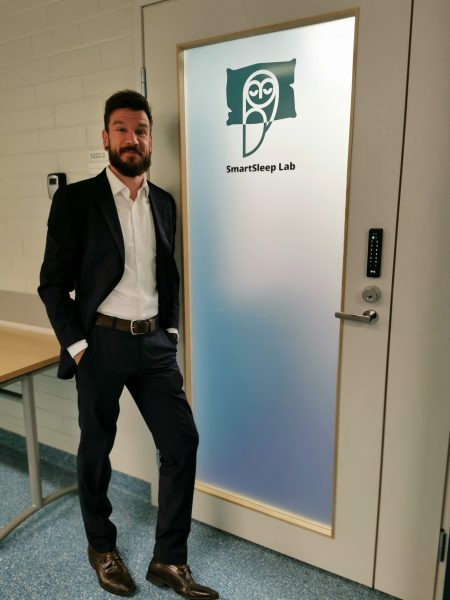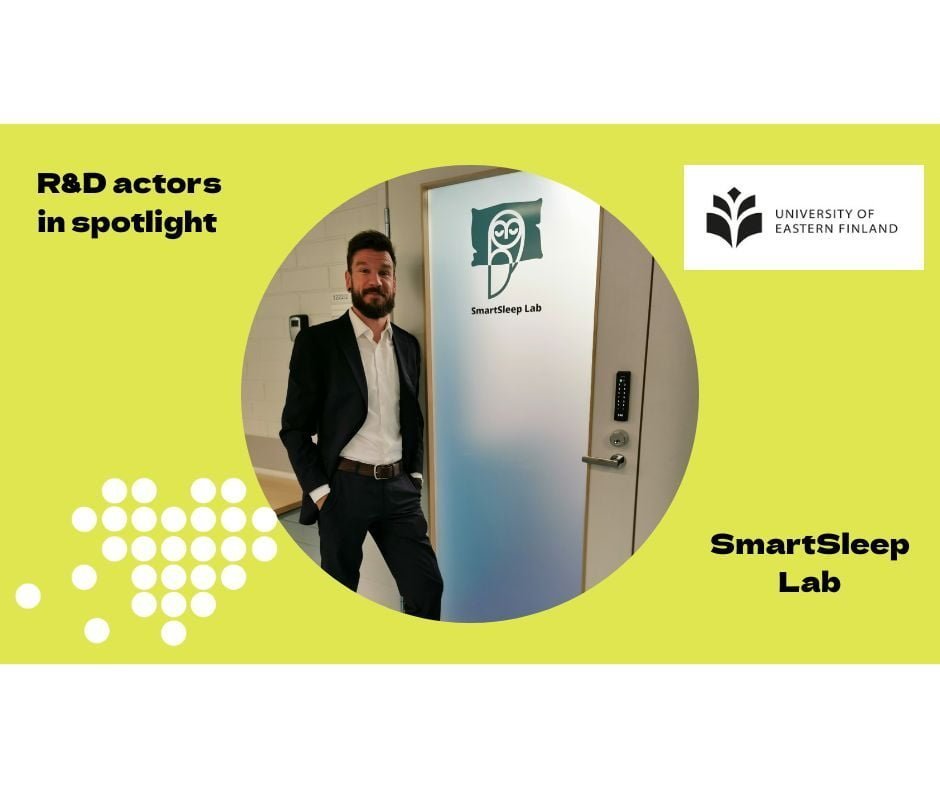SmartSleep Lab, a research laboratory based on the principles of open science, was established at the Department of Technical Physics, University of Eastern Finland. The laboratory environment provides a unique setting for sleep research and serves as a versatile testing environment for health technology organisations. The laboratory enables the product development, testing and validation studies of various health tech products and supports research in the field as well as the development of new diagnostic and treatment methods.
Developed for RDI and teaching activities, the SmartSleep Lab strengthens Kuopio’s status as one of the European centres of sleep research. The SmartSleep Lab operates with the principles of open data. Its aim is to share anonymised data for the needs of the scientific community and business life. In practice, the lab can be used by e.g. health technology companies for testing their prototypes in an authentic environment that corresponds to the clinical environment or getting help on the path to approval of a medical device. This ERDF project began in August 2021 and ended in August 2023. A further long-term goal is to obtain certification and FINAS accreditation for the laboratory.
Primary focus of research – growing sleep disorder rates
The laboratory operates in close cooperation with Kuopio University Hospital, Savonia University of Applied Sciences and different fields of science at the University of Eastern Finland. The Kuopio Health innovation ecosystem and several companies from the region were also involved in the laboratory project.
“The primary focus of SmartSleep Lab is on conducting and developing scientific research, which creates new openings and development ideas. There is a demand for new health technology solutions as different sleep disorders are becoming increasingly commonplace and there is a need for sleep studies. All data-intense fields of medicine, such as sleep medicine and radiology are undergoing a major change as various measurement and data processing methods are rapidly evolving. The clinical validation of these methods is crucial. At the same time, the professionals who apply the methods must receive supplementary training on the use of the new technologies”, says Adjunct professor Samu Kainulainen.
The laboratory has a fully soundproof research space completely undisturbed by any noises from the outside. The space includes two sleep rooms and a control room used for nighttime monitoring and later polysomnography analysis. Polysomnography includes over 20 different simultaneous measurements performed overnight (such as EEG, ECG, oxygen saturation, leg muscle activity eye movement, and breathing functions).

The control room is used to monitor and analyse polysomnography.
This is the first time that sufficiently extensive and openly shared sleep datasets have been made available for the needs of scientific research and the development of technologies. The data contained by the Smart Sleep Lab databank is constantly updated and the data is used to study more closely what healthy sleep is like and how often healthy test subjects have a sleep disorder requiring treatment. The laboratory also plays an important role in an international sleep apnoea study launched earlier in which the Sleep Technology and Analytics research group of the University of Eastern Finland participates.
The laboratory will be initially used to measure healthy volunteers as it is important to also obtain sleep data of healthy persons for sleep study purposes. So far, there is little research data available on healthy test subjects as sleep laboratories are typically used to examine a suspected illness. The consistency of the data entered into the databank is ensured and annotated, which allows including both measured signals as well as sleep stages and other events recorded during the night such as leg movements and respiratory arrests. AI algorithms have also been coded to the background to provide data in an analysed format.
“The databank containing the data of healthy test subjects also allows us to show that many incorrectly believe that they are healthy sleepers. Ultimately, we are also not yet fully aware of what ‘healthy’ means when it comes to sleep. We also wish to use this dataset to further specify this definition. We must have a fairly good understanding of what healthy sleep is if we wish to find features of signals that enable us to better diagnose sleep disorders. Unless we can understand changes in the microfeatures of healthy sleep, it will be difficult for us to analyse the pathological changes caused by sleep disorders”, Kainulainen explains.
“Even a single measurement will produce a vast amount of data and formatting this data is a difficult task. The format used for the data and being able to access it is a major problem. We observed that there is a need for a universal data format readable by all the most commonly used programming languages. During the project, we developed such a data process from scratch and this format will be published in an open access format in autumn 2023. A scientific article will also be published on the data, after which the data itself can be made public. The data will be available to anyone, anywhere, but users are required to refer to the descriptive scientific publications on both the data and its format”, Kainulainen continues.
The test measurements of the Savonia University of Applied Sciences and the Vireeksi project carried out by Savo Vocational College have also been performed during the development of the lab activities. The project included both lifestyle intervensions as well as sleep studies for professional drivers. At the same time, the laboratory was used to test how occupational healthcare and basic healthcare respond to the extensive polysomnography data produced by the laboratory and what would be the best way to formulate the report template to make it as accessible as possible.
Education activities and business clients
The laboratory activities are also closely linked to education. In the future, the SmartSleep Lab can be employed in the education of medical students and degree programmes in the field of healthcare at Savonia. As educational institutions have high student volumes, the institutions struggle to provide education to the students alone, and the sleep laboratory may be helpful in providing clinical, practice-oriented training.
“The laboratory primarily provides its services to the university’s master’s and doctoral degree programmes in technology. The SmartSleep Lab employs two extremely experienced nurses in clinical neurophysiology skilled in providing training in clinic and research work, which will be beneficial for those interested in a future career as a hospital physicist, for instance”, Kainulainen explains.
Additionally, the activities aim to provide a clear path, that also includes SmartSleep Lab’s services, for the professionals in health technology in the Kuopio region and especially the testing and validation of applications requiring MDR approval.
One of the laboratory’s business clients mentioned by Kainulainen is eLive Ecosystem Oy, a company offering a measurement device developed for diagnosing sleep apnoea. eLive Ecosystem is a health and wellbeing technology company with international operations established in 2016. The company specialises in non-contact measurement of physiological parameters.
“The role of SmartSleep Lab is to provide the company with a series of measurements required for the approval of a medical device. The series of measurements allows us to demonstrate whether the company’s device used for diagnosing sleep apnoea can give a reliable diagnosis”, Kainulainen explains.
Unique innovation environment
“There is no other equivalent sleep laboratory intended for research use in Finland. The laboratory further strengthens the unique Savilahti innovation environment developed around health and well-being and the laboratory supports cooperation between companies and RDI operators.”

Samu Kainulainen encourages companies to contact him.
“Prices are set for clients on a case and project basis, as we must first discuss what kinds of measurements will be necessary, how many of them are needed and how much of the laboratory’s specialist resources the project is going to require. Of course, the data in the sleep databank is free of charge for all. You can become a SmartSleep Lab client by directly contacting us. You can call or email me”, Kainulainen concludes.

